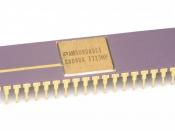�PAGE � Current Event Paper � PAGE �5�
Current Event Paper Week Five
Charles Hill
University of Phoenix
Economics for Business II, ECO 361
Timothy Jeffcoat
June 18, 2007
Antitrust laws are used in the United States to prevent actions such as anti-competitive behavior and unfair business practices by organizations. The antitrust laws were brought against the Bell telephone company due to this organizations monopolistic activity. The courts decided in this case that the Bell Company was an unfair monopoly and that the Bell company, in order to promote competition, should be broken up into different parts. Decisions such as this are based on practices deemed to be illegal such as those that hurt businesses or consumers or both. The recent case against Microsoft is another example of antitrust law which prohibits agreements in restraint of trade, monopolizations and tie-in schemes. More recently Intel has been pulled into court by AMD for violating antitrust laws.
AMD filed an antitrust lawsuit against Intel in June 2005 under section 2 of the Sherman Antitrust Act and sections 4 and 16 of the Clayton Act. AMD felt that Intel engaged in ongoing illegal, anticompetitive conduct to maintain their monopoly power and to limit AMD's ability to compete in the computer market. In March of 2005 the Japanese government's Fair Trade Commission recommended that Intel be sanctioned for its exclusionary misconduct. In July, 2005 the European Commission raided Intel's offices across Europe as part of its ongoing investigation into Intel's business practices. AMD also claims that Intel has paid huge sums to Dell and Tashiba to get them to not do business with AMD. AMD in 2002 had 23 percent of Sony's business, 8 percent in 2003 and 0 percent in 2004. AMD claims that this is due to Intel's payments to Sony. AMD also alleges that Intel paid NEC millions of dollars to cap its purchases of AMD processors. The lawsuit also states that when AMD came on board with HP for use in its mobile computers Intel withheld HP's fourth quarter 2004 rebate check and would not waive HP's failure to meet sales goals. In 2000 Compaq gave a large amount of business to AMD and Intel responded by withholding delivery of critical server chips.
Intel claims that its rise in the market place is due to superior performance of its chips and staying ahead of market technology. Intel used the rise in popularity of AMD's Opteron chip as an example of the possibility of AMD to compete when AMD makes a good part it will sale and when they do not have a competitive chip it will not sale. Intel also claims that it does not buy exclusively nor does it offer first dollar rebates. Intel claims that it offers a discount program which is stepped at basically twenty, forty, sixty and eighty percent. A customer will get the lowest, if any, discount in the twenty percent range and the largest discount at the eighty and above percent range.
The economic outcome of a potential complete monopoly by Intel could potentially be disastrous for consumers by raising the cost of processing units and also the computer market. Due to the growth of computer chips, storage capacity and other parts of the computer, the customer can not keep up with the technological advances unless he would like to buy a new computer every six months. The price of the computer is minimal compared to just a decade ago. If one organization is able to maintain a monopoly on [arts as important as processors the advances may not be as great and the price could rise dramatically. Politically, this suit is gaining the attention of the global business community and also has the possibility to change the landscape of antitrust laws in the United States and possibly on a global scale. The main question in the mind of most large organizations is when such tactics as those employed by Intel cross the line from vigorous competitiveness against other organizations within the market into unlawful preservation of a monopoly. The business community is gaining hope that this case will help set guidelines in this area since the Microsoft decision was so ambiguous as to be unhelpful.
Companies will always compete using all the methods at their disposal. Methods that some organizations feel are illegal other organizations feel are fair and ethical. The courts at this stage must set guidelines that state just how far a company may go to protect its market share and what methods are, in fact, legal to achieve this goal. The Microsoft case did little, if anything, to set guidelines or expectations for the global or United States business community. It is the hope of many that the courts will use this high profile case to set the guidelines that the business community feels is necessary to let them know just what is legal and how far they can go.
Reference:
Mutschler, Ann Steffore. Intel Ordered to Produce Foreign Discovery in AMD Antitrust Suit,
Vol. 53, Issue 2, p 9.





